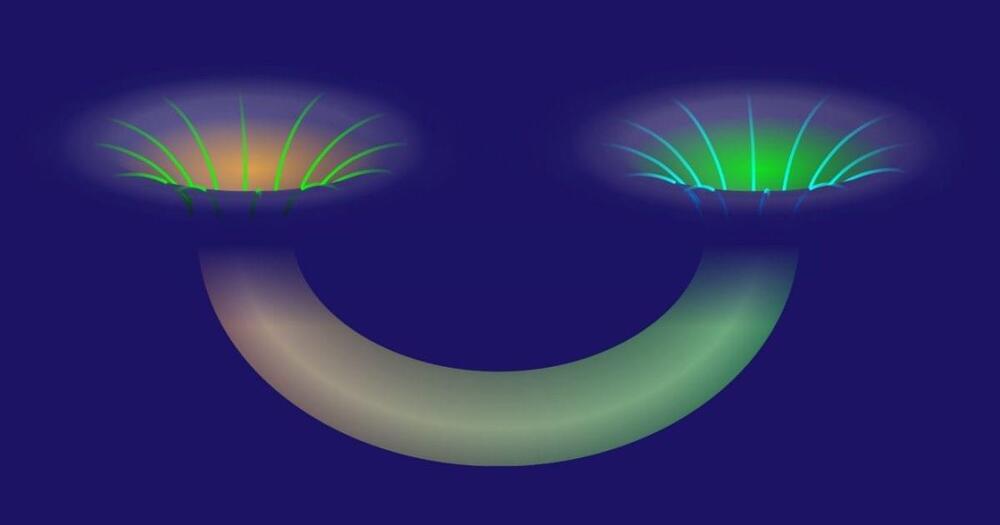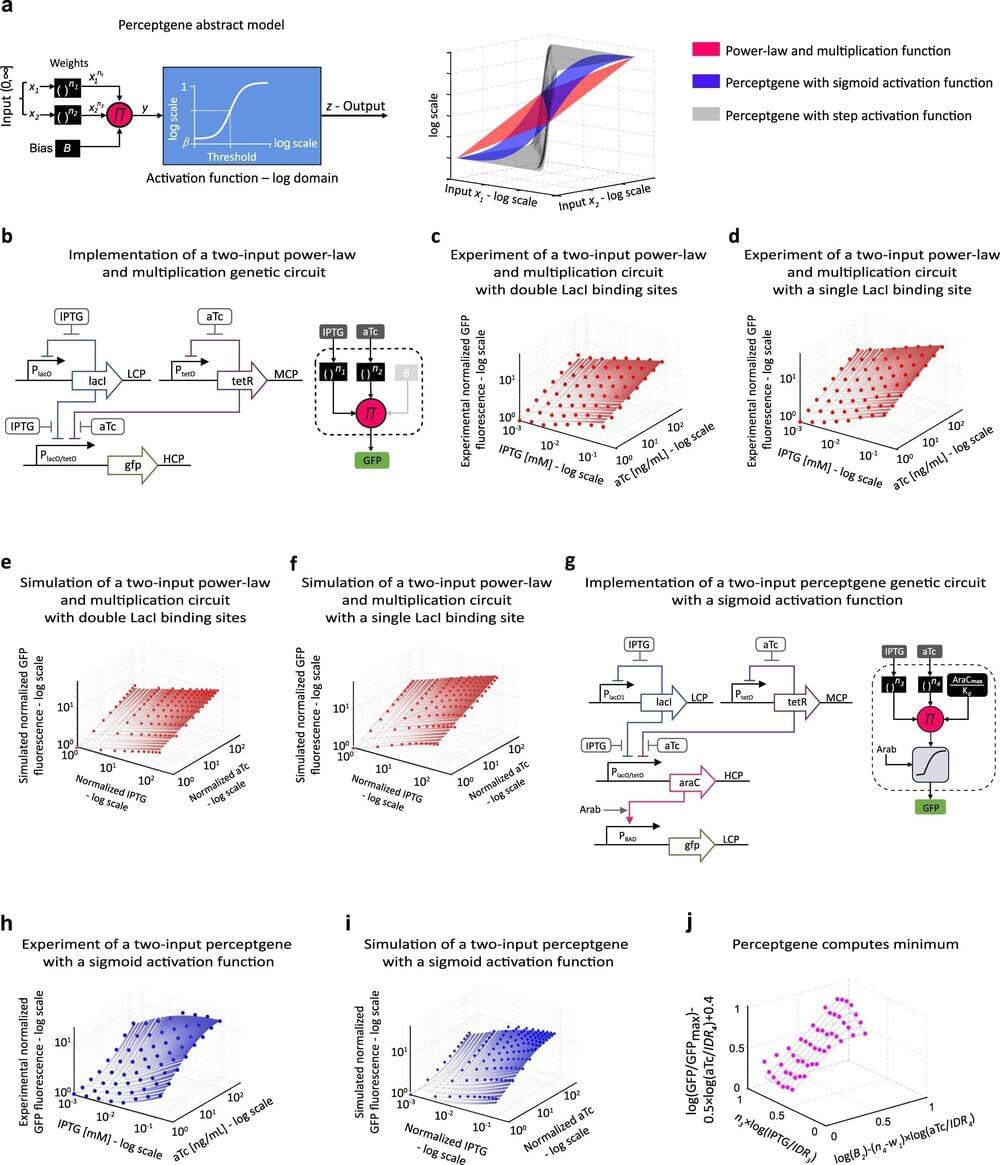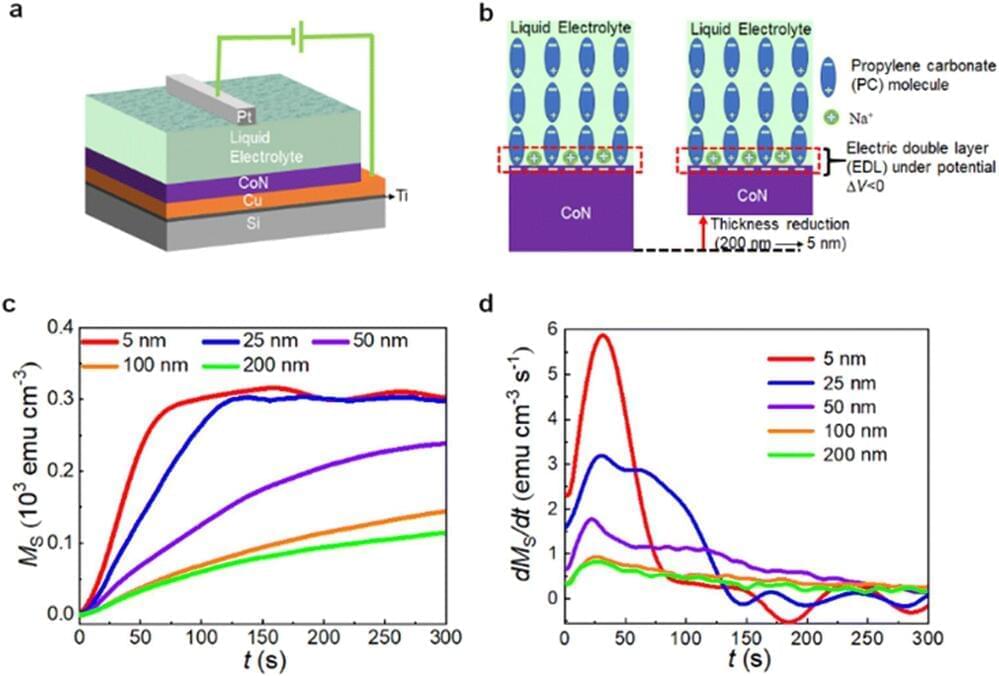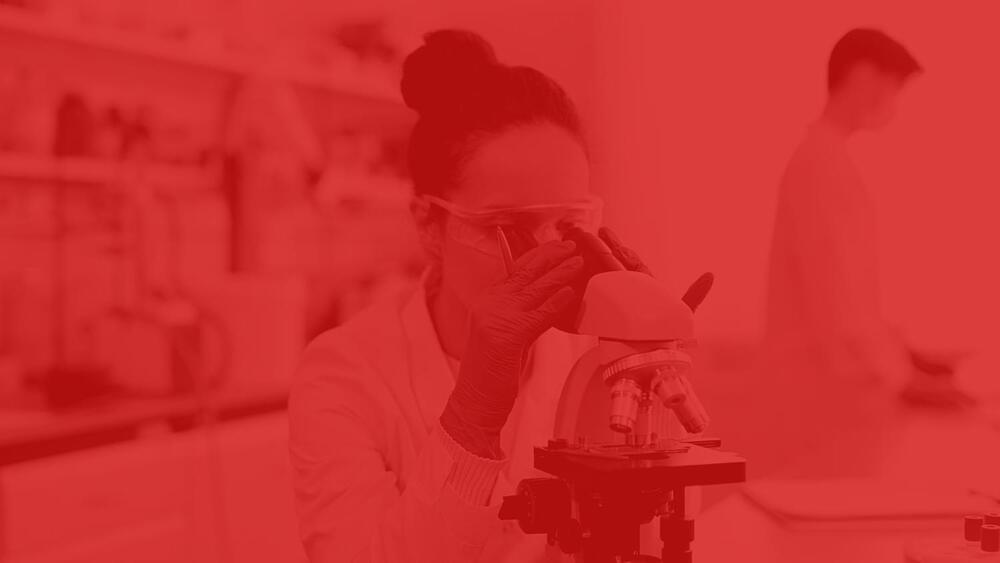We think of physical reality as what objectively exists, independent of any observer. But relativity and quantum physics say otherwise.



Bringing together concepts from electrical engineering and bioengineering tools, Technion and MIT scientists collaborated to produce cells engineered to compute sophisticated functions— biocomputers of sorts.
Graduate students and researchers from Technion—Israel Institute of Technology Professor Ramez Daniel’s Laboratory for Synthetic Biology & Bioelectronics worked together with Professor Ron Weiss from the Massachusetts Institute of Technology to create genetic “devices” designed to perform computations like artificial neural circuits. Their results were recently published in Nature Communications.
The genetic material was inserted into the bacterial cell in the form of a plasmid: a relatively short DNA molecule that remains separate from the bacteria’s “natural” genome. Plasmids also exist in nature, and serve various functions. The research group designed the plasmid’s genetic sequence to function as a simple computer, or more specifically, a simple artificial neural network. This was done by means of several genes on the plasmid regulating each other’s activation and deactivation according to outside stimuli.

Universitat Autònoma de Barcelona (UAB) researchers have developed a magnetic material capable of imitating the way the brain stores information. The material makes it possible to emulate the synapses of neurons and mimic, for the first time, the learning that occurs during deep sleep.
Neuromorphic computing is a new computing paradigm in which the behavior of the brain is emulated by mimicking the main synaptic functions of neurons. Among these functions is neuronal plasticity: the ability to store information or forget it depending on the duration and repetition of the electrical impulses that stimulate neurons, a plasticity that would be linked to learning and memory.
Among the materials that mimic neuron synapses, memresistive materials, ferroelectrics, phase change memory materials, topological insulators and, more recently, magneto-ionic materials stand out. In the latter, changes in the magnetic properties are induced by the displacement of ions within the material caused by the application of an electric field.

Synthetic biology offers a way to engineer cells to perform novel functions, such as glowing with fluorescent light when they detect a certain chemical. Usually, this is done by altering cells so they express genes that can be triggered by a certain input.
However, there is often a long lag time between an event such as detecting a molecule and the resulting output, because of the time required for cells to transcribe and translate the necessary genes. MIT synthetic biologists have now developed an alternative approach to designing such circuits, which relies exclusively on fast, reversible protein-protein interactions. This means that there’s no waiting for genes to be transcribed or translated into proteins, so circuits can be turned on much faster—within seconds.
“We now have a methodology for designing protein interactions that occur at a very fast timescale, which no one has been able to develop systematically. We’re getting to the point of being able to engineer any function at timescales of a few seconds or less,” says Deepak Mishra, a research associate in MIT’s Department of Biological Engineering and the lead author of the new study.
It’s not really a Star Wars story unless there’s a lovable or memorable droid stealing the spotlight. But, when you really stop and think about it, there’s also something profoundly tragic about the role artificial lifeforms play in the Star Wars universe.
PATREON
Support this project on Patreon:
https://www.patreon.com/popdetective.
PAYPAL
Make a one-time donation via PayPal:
https://www.paypal.me/popdetective.
WISHLIST
Send research materials for video essays:
https://www.amazon.com/hz/wishlist/ls/VPZW4GU512ON?ref_=wl_s…atfound-20.
REFERENCES
• Race in American Science Fiction by Isiah Lavender III
https://www.goodreads.com/book/show/10364882-race-in-american-science-fiction.
• Imagining Slaves and Robots in Literature, Film, and Pop Culture by Gregory Jerome Hampton.
https://www.goodreads.com/book/show/26371201-imagining-slave…ar-culture.
• The Cambridge Companion to Slavery in American Literature (Chapter 15) Beyond the Borders of the Neo-Slave Narrative by Jeffrey Allen Tucker.
https://www.goodreads.com/book/show/39293853-the-cambridge-c…literature.
• Asimov on Science Fiction in Science Fiction Digest, October-November 1981
https://archive.org/details/sfdigest19811011
• Janelle Monae’s “Many Moons” music video.
NOVELS REFERENCED
Synopsis: In this talk we articulate a positive vision of the future that is both viable given what we know, and also utterly radical in its implications. We introduce two key insights that, when taken together, synergize in powerful ways. Namely, (a) the long-tails of pleasure and pain, and (b) the correlation between wellbeing, productivity, and intelligence. This informs us how to distribute resources if we want to maximize wellbeing. Given the weight of the extremes, it is important to take them into account. But because of the causal significance of more typical hedonic ranges, engineering our baseline is a key consideration. This makes it natural to break down the task of paradise engineering into three components:
Avoid negative extremes.
increase hedonic baseline, and.
achieve new heights of experience.
With regards to : the future of consciousness is anodyne. It lacks extreme suffering in any of its guises. We will see how, if we aim right, a significant proportion of extreme suffering can be prevented with pragmatic technologies already available. Even just applying what we know today would be as significant for the reduction of suffering as the advent of anesthesia was in the context of surgery.
On : the future of consciousness is engaging. From novelty generation to Buddhist annealing, baseline-enhancing interventions will change the way we think of life. It is not only about making everyday fun, but also the economics of it.
And : the future of consciousness is ecstatic. A science of ecstasy will allow us to safely and reliably sample from a wide range of time-tested ultra-blissful peak experiences. A common cause with other sentient beings, and indeed with the interests of consciousness at large, can be forged in the knowledge of such deep experiences.
They give you a genuine, non-sentimental, reason to live. Together, action on these three levels can significantly advance the cause of eliminating suffering and engineering paradise. And our assessment is: there is a lot of low-hanging fruit in this space. Let’s pick it up!

Things can always get smaller.
That might also be true for one of our much-debated energy sources. Even though experts claim that nuclear energy is a reliable and sustainable energy source, the nuclear energy debate continues, with small-scale nuclear reactors being developed around the world. They are said to be a safer and less expensive form of nuclear power. On the other hand, full-scale nuclear reactors are large, expensive, and take a long time to build, and making them smaller, portable, cheaper, and safer could ensure that solar, wind, and hydro are not getting all the attention.
In this video from the YouTube channel Undecided with Matt Ferrell, you can delve into the world of tiny modular reactors, which are gaining popularity as the first versions come up in China and new facilities open in Canada. The YouTuber even refers to former SpaceX engineers who have scaled things down to the level of a microreactor, and ask whether this could be the future of nuclear energy. If you want to learn more, make sure you watch the video above, and as always, enjoy!

